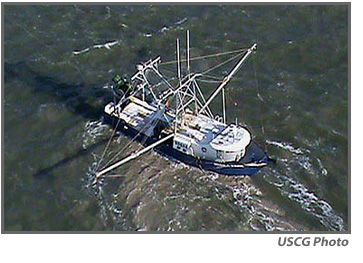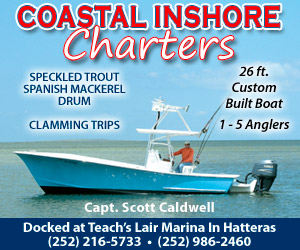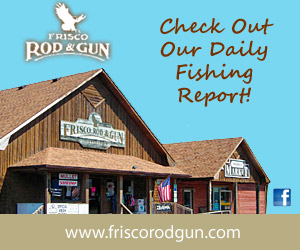A rulemaking petition submitted recently to the North Carolina Marine Fisheries Commission is asking that inside waters be closed to shrimp trawling, a proposal that watermen say would devastate their business and deprive consumers of the state’s second most popular seafood.
Trawl nets are already prohibited by state law in secondary nursery areas, but petitioner Tim Hergenrader, a New Bern artist, is seeking to have the internal coastal waters designated permanent secondary nursery areas.
If the rule is approved, it would effectively prohibit trawling in the sound waters and, as a result, make shrimp off limits much of the year.
In a June 26 letter to the commission, Dare County Board of Commissioners Chairman Warren Judge said that the closing the sounds to trawling would severely harm Dare County’s commercial fishing industry.
“Our Working Watermen depend on access to inshore waters, where the majority of North Carolina’s shrimp are harvested,” he wrote. “Banning access to these waters would increase fuel and other costs, which would have an adverse effect on seafood prices and product availability at the wholesale and consumer level.”
The commission has 120 days from June 20, the date the petition was submitted, to either grant or deny the petition. If the petition is granted, it would start the public rulemaking process.
Patricia Smith, a commission spokeswoman, said that a meeting scheduled for Friday to consider the petition was cancelled in order to give the Commission’s advisory committees more time to review the petition. The matter will likely be on the agenda of the Marine Fishery Commission’s August meeting, she said.
Shrimping is the second largest fishery in the state, behind blue crabs, she said. And she affirmed that the majority of shrimp are caught in the sound.
“It does have the potential to be a very emotional issue,” Smith said.
“There have been several (a handful of) petitions for rulemaking submitted to the Marine Fisheries Commission in the past several years,” Smith added. “At least one was granted in 2012 to create new seed oyster management areas in the New River. In other cases, the petition may have been denied, but the issue was then taken up through the fishery management plan process and later passed.”
Hergenrader, who sells his art as “T Rader,” does not appear to have a current listed phone number. On an art website called Carolina Creations, Hergenrader was described as a native Nebraskan who moved to New Bern to concentrate on his art. He retired in 2004 from his job as spokesman for the Nebraska Emergency Management Agency.
A commentary piece written by Hergenrader, headlined “’Game Fish’ Right Thing to Do” was published on May 12 by Compass News 360 Degrees in Pamlico County.
The gamefish bill, which was pushed by the non-profit recreational fishing group, Coastal Conservation Association, would have closed red drum, spotted sea trout, and estuarine striped bass to commercial harvest. The bill died in a legislative committee earlier this month.
Hergenrader said in the commentary that the CCA–which he referred to as the Coastal Conservation Commission – did not want to force watermen out of business or ban nets. The reason the group supported this bill, he wrote, is that the fish are worth more to the state as gamefish than commercial sales.
Commercial fish farms, rather than wild-caught finfish and shellfish, are the future of the fishing industry, he continued.
Other states with gamefish bills and net bans in place, he wrote, “are reaping the financial whirlwind known as recreational fishing and laughing all the way to the bank at North Carolina for clinging to the old way” of selling fish for a fraction of its value to the recreational fisheries.
“This bill is all about improving the economic well being of eastern North Carolina,” Hergenrader wrote about gamefish, “and providing much needed revenues to the taxpayers of the entire state.”
Similarly, in his petition for closing inland waters to trawling –which makes no mention of the CCA — Hergenrader purports that the change would represent a minor economic impact to fishermen. Profits could even improve, he contends.
“The inshore shrimp would not be lost for harvest, since shrimp trawlers will harvest these shrimp in the ocean after they mature and continue their life cycle by migrating from inshore waters to the ocean,” the petition said.
“At that point, it is possible that shrimpers would have a larger harvest due to the fact that the shrimp would be larger in size.”
But Karen Willis Amspacher, from Harkers Island, said that shrimping provides the bulk of income for the state’s commercial fishermen and is the sole source of income for some.
“The shrimping industry would be non-existing,” she said.
The Coastal Fisheries Reform Group, which works closely with the CCA, has criticized shrimp trawlers for catching large amounts of untargeted fish and has recently made proposals to the Marine Fisheries Commission to reduce bycatch in shrimp trawling operations.
In a commentary piece in Compass News responding to Hergenrader, Sherrill Styron, owner of Garland Fulcher Seafood in Oriental, said that with or without shrimp nets, few juvenile fish reach maturity.
“In the overall picture of juvenile mortality, shrimp boats are of minimal impact compared to natural predation from other species like rockfish and red drum and environmental factors affecting water,” wrote Styron, who has been a member of various fisheries advisory committees in the state.
“Shrimp trawl juvenile mortality does not even come close to what nature does year after year.”
Opponents of the proposed rule also say that North Carolina’s coast is not like South Carolina’s – a comparison that the petition made in projecting a healthy harvest of shrimp after banning trawling in secondary inland waters. The ocean along the southern coast is shallower and more hospitable to shellfish nursery areas and juvenile populations than in North Carolina, where most of the shrimp are caught before they reach the ocean.
“People don’t understand with shrimp,” said Kenny Rustick, a life-long shrimper from Marshallberg. “When they (the shrimp) go off the coast into the ocean –they’re gone.”
As it is, he said, only about 45 percent of the inland waters are open to trawling, and a lot of that area is unsuitable for trawling.
As the shrimp grow and start moving toward the coast, there are fewer of them, and more competition for them. And bigger shrimp typically do not get more valuable by the pound, he said.
Rustick said that there is a limited window when the shrimp can be harvested.
But the market demand is good, he said, and the species is not over-fished or stressed.
“If you sit there and wait for a shrimp to grow,” they won’t be available, he said. “Shrimp are only here for a certain amount of weeks.”
Right now, Rustick said, only about 12 percent of shrimp sold to consumers is wild-caught – despite the growing demand for local, fresh seafood.
Most shrimpers in North Carolina, he said, do not have large enough boats to safely shrimp in the ocean. Usually the speed and/or direction of the wind would present hazardous conditions.
“The small boats wouldn’t get enough working time to even think about making a living out in the ocean,” he said.
Rustick said that 80 percent of his income is made in shrimping. Since commercial fishermen in North Carolina by necessity are opportunistic and adaptable, shrimping is likely supporting them all to some extent.
No one man’s petition, or one lobbying group, he said, should have the power to take that income from an already stressed livelihood.
“It stops the growth of us,” he said. “It’s 24-7 that we’ve got to worry about them, much less the cost of fuel.
“Each one of us,” he added, “is an independent and small business.”
FOR MORE INFORMATION
Click here to read Tim Hergenrader’s petition to the Marine Fisheries Commission to ban trawling in inside waters.
Click here to read Tim Hergenrader’s commentary on the gamefish bill and trawling





